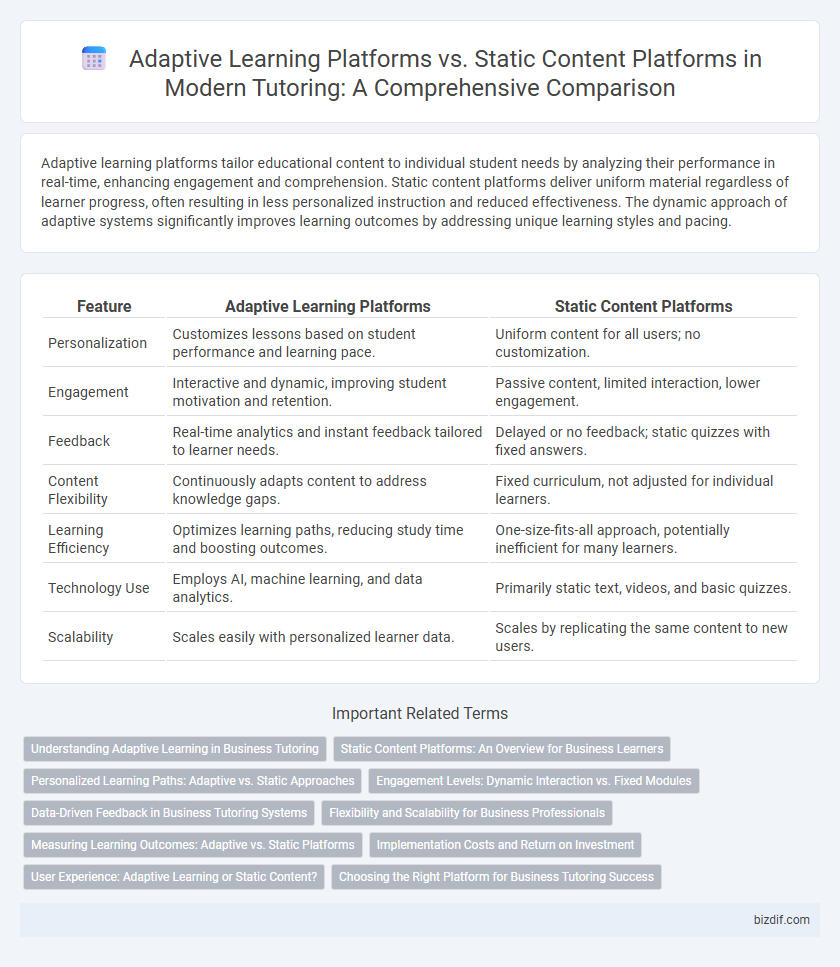Adaptive learning platforms tailor educational content to individual student needs by analyzing their performance in real-time, enhancing engagement and comprehension. Static content platforms deliver uniform material regardless of learner progress, often resulting in less personalized instruction and reduced effectiveness. The dynamic approach of adaptive systems significantly improves learning outcomes by addressing unique learning styles and pacing.
Table of Comparison
| Feature | Adaptive Learning Platforms | Static Content Platforms |
|---|---|---|
| Personalization | Customizes lessons based on student performance and learning pace. | Uniform content for all users; no customization. |
| Engagement | Interactive and dynamic, improving student motivation and retention. | Passive content, limited interaction, lower engagement. |
| Feedback | Real-time analytics and instant feedback tailored to learner needs. | Delayed or no feedback; static quizzes with fixed answers. |
| Content Flexibility | Continuously adapts content to address knowledge gaps. | Fixed curriculum, not adjusted for individual learners. |
| Learning Efficiency | Optimizes learning paths, reducing study time and boosting outcomes. | One-size-fits-all approach, potentially inefficient for many learners. |
| Technology Use | Employs AI, machine learning, and data analytics. | Primarily static text, videos, and basic quizzes. |
| Scalability | Scales easily with personalized learner data. | Scales by replicating the same content to new users. |
Understanding Adaptive Learning in Business Tutoring
Adaptive learning platforms in business tutoring utilize real-time data analytics and AI algorithms to tailor content to individual learner needs, improving engagement and knowledge retention. Unlike static content platforms, these systems adjust difficulty levels and topics dynamically, ensuring personalized learning paths that address specific skill gaps. This targeted approach enhances overall efficiency and outcomes in corporate training by enabling continuous performance assessment and customized skill development.
Static Content Platforms: An Overview for Business Learners
Static content platforms provide business learners with consistent, unchanging educational materials that are easy to access and review at any time. These platforms typically include pre-recorded videos, PDFs, and quizzes that do not adjust based on learner performance, ensuring uniform delivery of information. Businesses benefit from static content platforms by offering standardized training modules that can be quickly deployed across teams without the need for continuous updates or customization.
Personalized Learning Paths: Adaptive vs. Static Approaches
Adaptive learning platforms use algorithms to analyze student performance and tailor personalized learning paths that dynamically adjust to individual strengths and weaknesses. Static content platforms deliver uniform material to all students regardless of their skill levels, limiting customization and potentially slowing progress. Personalized learning paths in adaptive systems enhance engagement and mastery by continuously adapting to real-time learner data.
Engagement Levels: Dynamic Interaction vs. Fixed Modules
Adaptive learning platforms utilize real-time data to tailor content and pacing according to individual student performance, significantly enhancing engagement levels through dynamic interaction. Fixed module platforms deliver predetermined static content with limited customization, often resulting in lower student motivation and interaction. Enhanced engagement in adaptive platforms fosters deeper understanding and retention by continuously adjusting challenges to match learner abilities.
Data-Driven Feedback in Business Tutoring Systems
Adaptive learning platforms in business tutoring systems leverage real-time data analytics to provide personalized feedback, enhancing learner engagement and improving performance outcomes. These platforms continuously assess student progress and adjust instructional content based on individual learning patterns, unlike static content platforms that deliver uniform material without adjustments. Data-driven feedback enables targeted interventions, facilitating skill mastery and optimizing the overall tutoring experience.
Flexibility and Scalability for Business Professionals
Adaptive learning platforms offer unparalleled flexibility by tailoring educational content to individual learning styles and paces, ensuring business professionals can efficiently acquire relevant skills. These platforms scale effortlessly across diverse teams, supporting varied expertise levels and evolving organizational needs, unlike static content platforms that deliver uniform material lacking personal relevance. This dynamic adaptability maximizes engagement and knowledge retention, driving measurable performance improvements in professional development.
Measuring Learning Outcomes: Adaptive vs. Static Platforms
Adaptive learning platforms utilize real-time data analytics and personalized feedback to continuously adjust instructional material, resulting in improved student engagement and higher retention rates. Static content platforms rely on predetermined materials that lack flexibility, often leading to inconsistent learning outcomes and reduced efficiency in skill acquisition. Research shows adaptive systems can increase test score improvements by up to 30% compared to static content approaches.
Implementation Costs and Return on Investment
Adaptive learning platforms demand higher initial implementation costs due to advanced AI integration and continuous content updates but offer improved student engagement and personalized learning paths that significantly enhance retention rates. Static content platforms involve lower upfront expenses with fixed curricula, yet they often result in diminished long-term ROI because they fail to address diverse learner needs, leading to lower completion rates and engagement. Investing in adaptive platforms yields superior returns by boosting effectiveness and reducing the need for repetitive interventions, ultimately optimizing tutoring outcomes.
User Experience: Adaptive Learning or Static Content?
Adaptive learning platforms enhance user experience by personalizing content based on individual learner progress, resulting in higher engagement and retention. Static content platforms offer uniform material that may not address diverse learning needs, often leading to reduced motivation and slower skill acquisition. The dynamic feedback mechanisms of adaptive systems ensure continuous improvement tailored to users' strengths and weaknesses.
Choosing the Right Platform for Business Tutoring Success
Adaptive learning platforms leverage real-time data analytics and personalized content delivery to tailor tutoring sessions according to individual student needs, significantly enhancing engagement and retention rates. Static content platforms rely on predefined materials and linear progressions, often lacking flexibility to address diverse learning styles or immediate skill gaps. Prioritizing an adaptive learning platform ensures dynamic, responsive support that drives measurable improvements in student performance and maximizes business growth in the competitive tutoring market.
adaptive learning platforms vs static content platforms Infographic

 bizdif.com
bizdif.com